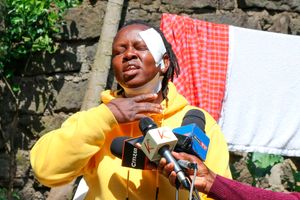
Nakuru County Commissioner Clifford Kibaara on June 2, 2025 at Rift Valley DCI headquarters, displays ammunition recovered from a four-member gang that has been terrorising businesspeople.
When Nakuru was elevated to city status more than two years ago, the once modest transit town, located 160 kilometres from Nairobi along the Northern Corridor, was transformed into a booming business hub.
Real estate developers, food companies, financial institutions, retailers and individuals eager to cash in on the newfound city status scrambled for land to build homes, learning institutions and other businesses.
As a result, the cosmopolitan city witnessed a rapid increase in population alongside a proliferation of housing projects, factories, colleges and other institutions.
Fast forward to 2025 and Nakuru has unfortunately become a haven for criminals. Estates that were once highly sought after by low income earners have in recent times turned into criminal dens.
According to governance expert David Ngugi, the surge in crime is directly linked to Nakuru’s rapid growth and swelling population.
“The elevation of Nakuru to city status led to an influx of people. With increased population comes increased crime. Gangs that once operated in places such as Nairobi and Kiambu have likely extended their reach to Nakuru to exploit new opportunities,” he said.
Mr Ngugi said there is a need for a multifaceted and collective approach by the police, the public and other stakeholders to combat the growing insecurity.

Nakuru County Commissioner Clifford Kibaara and his police counterpart Michael Mwaura display an AK-47 rifle at the Rift Valley DCI headquarters on June 2, 2025. It was recovered from a suspected gang that has been terrorising residents.
Over the past month, Nakuru City has made headlines for all the wrong reasons, with a chilling wave of violent robberies and murders igniting fear among residents and stained the city's once vibrant image.
Six people, including a police officer, have been killed by armed criminals. M-Pesa shops have become primary targets of gun-wielding thugs using boda bodas to execute crimes and escape swiftly.
Among the victims was Mr Jackson Mwangi, a businessman in Nakuru’s Pipeline area. He was shot and killed by armed robbers who stormed his shop on May 21. Trader Paul Ndung’u was murdered in cold blood in Bahati. The killings have sparked outrage among residents and members of the business community, many of whom fear the resurgence of organised criminal gangs.
On June 1, armed thugs ambushed police officers on patrol in the Freehold area. Constable Josphat Ruto was shot in the pelvic region and later died from excessive bleeding while receiving treatment at Nakuru Level Five Hospital. Two other officers were seriously injured. During the shootout, one of the robbers was shot but he escaped with injuries.
Following this attack and the growing wave of violent crime, detectives arrested six suspects including an ex-convict believed to be the ringleader of a gang that has terrorised Nakuru residents in recent weeks.
Nakuru County Commissioner Loyford Kibaara said the suspects led investigators to Bondeni, where an AK-47 rifle believed to have been used in several crimes was recovered.

Nakuru County Commissioner Clifford Kibaara (centre) and other top county security personnel speak to journalists at Rift Valley DCI headquarters on June 2, 2025, after police arrested suspected gang members and recovered an AK-47 rifle.
Among those arrested was a 45-year-old woman who allegedly operated a kiosk in Bondeni and was tasked with hiding the weapon.
“In the past week alone, several businesspeople have been killed. Ballistic tests confirmed that the cartridges found at crime scenes were 7.62 mm special ammunition, typically used in AK-47s,” said Mr Kibaara.
The suspects were arrested at Umoja Lodging in Nakuru City where they had reportedly gathered. “Our investigations indicate that the criminals belong to the outlawed Confirm gang. We have arrested six suspects aiding our inquiries, and we anticipate making more arrests as we move to dismantle the gang’s cells,” said a senior DCI officer, who spoke on condition of anonymity.
Although police investigations into the recent spate of murders are ongoing, intelligence reports suggest that members of the Confirm gang are likely behind the attacks. The gang, which was outlawed in December 2016 by former Interior Cabinet Secretary Joseph Nkaissery, initially operated by conning people through fraudulent mobile money transactions. Over time, it mutated into a heavily armed and dangerous group.
Members of the Confirm gang are said to be armed with crude weapons such as pangas, metal rods, swords, and, increasingly, firearms. Despite regular police swoops and arrests, the gang has shown resilience and continues to resurface.
Just a year ago, security forces cracked down on the gang under the directive of then Interior CS Dr Fred Matiang’i, driving many of its members out of Nakuru. However, investigations by the Nation reveal that remnants of the gang have been regrouping over the past year.
Other notorious gangs attempting to regroup include Mauki, Wa TZ, Nyuki, Gaza, and Dragon, all of which have a history of terrorising Nakuru residents. A senior police officer said that although many cells were dismantled, some groups are now trying to re-establish their networks.
“We have observed signs that criminal gangs are trying to regroup, but we are determined to prevent that from happening,” the officer said.
Investigations show that the Confirm gang had widespread operations in slums such as Kivumbini, Lake View, Kwa Rhoda, Kaptembwa, Flamingo, Kalolenim and Bondeni. Residents claim that as night falls, some of these informal settlements become no go zones, with gang members active both day and night.
Mr David Kimani, a resident of Bondeni, painted a grim picture. “They have devised ways to avoid police dragnets. The gang includes both young and adult criminals, and they have turned slums into crime fortresses,” he said.
Some residents allege that the gang enjoys protection from local politicians. “We all know two politicians who protect the gang. When gang members are arrested, they get bailed out quickly. These youth campaign for them during elections,” said a resident who spoke on condition of anonymity.

Nakuru County Commissioner Clifford Kibaara, on June 2, 2025 at the Rift Valley DCI headquarters, displays bullets recovered from suspected gang members.
In recent years, the gang has reportedly become more daring and lethal. Miriam Murigi a resident of Bondeni said that panga-wielding gangs have long been a menace. “Many people have been attacked and seriously injured. They steal phones and other valuables, and no one is spared—not even police officers.”
John Maina from Flamingo added that the gang has become more structured and politically linked. “During the 2013 and 2017 elections, they were used to intimidate opponents. Now they have evolved into a more dangerous outfit.”
Police sources corroborate these accounts, saying that Confirm members often possess crude weapons and are now increasingly using firearms. They continue to recruit idle, unemployed youth, especially school dropouts from slum areas in Nakuru West and Nakuru East constituencies.
“There are powerful people behind them. Despite frequent swoops and arrests, they resurface. We suspect there’s external protection,” said a senior police officer involved in recent operations.
In response to the escalating crime wave, Mr Kibaara said, “We will not allow the return of these criminal groups. Our investigations are ongoing, and we are pursuing several leads to make more arrests.”
Experts say that the rising crime in Nakuru is largely due to socioeconomic pressures on the youth. With limited opportunities, many are turning to crime in a desperate bid for survival.
Peer pressure, adverse childhood experiences such as neglect and drug abuse, and exposure to parental criminality in informal settlements are also major contributors.









